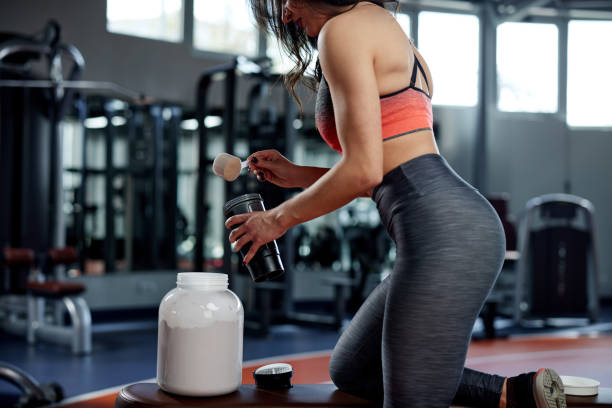Many people who go to the gym like Powerhouse Gym regularly take supplements. But just how effective are these workout supplements?
Some dietary supplements are aimed at helping people with specific goals. For example, these products may help runners (joint pain prevention) or bodybuilders (growing muscle mass). Other supplements are designed to improve performance and enhance recovery.
The truth of the matter is, there are supplements that live up to their promises. And there are those that are no more than hype.
But the one thing you need to keep in mind is that the purpose of the supplement is exactly that – to supplement – and they are not a substitute for food.
The goal should be to get what your body needs through your normal diet, and if there is a deficiency then you supplement it. In other words, begin with a balanced diet and add supplements on top of your food. Eating a complete meal with protein, carbs and healthy fat a few hours before you go to Max Fitness is definitely better than just drinking a protein shake or worse, popping a few tablets in lieu of food.
That said, if you choose to go the supplement route to aid you in your fitness journey and get the most from your workouts, you can start your search with the popular supplements we’ve mentioned here:
1. Creatine
Creatine is one of the top 3 workout supplements that sports scientists recommend. It’s naturally found in the muscles and brain. It boosts strength, muscle mass and helps produce energy for lifting heavy objects and high-intensity exercises.
Most athletes’ bodies can tolerate creatine and it’s one of the most-studied sports supplements.
But if you’re also taking nonsteroidal anti-inflammatory drugs (NSAIDs), drugs that affect the kidney, or anti-gout medication, speak with your doctor before taking this supplement. Creatine is generally safe but some people do experience side effects like muscle strains, weight gain, cramps, upset stomach, liver dysfunction, high blood pressure and kidney damage.
2. Leucine
Leucine is one of three branched-chain amino acids (BCAAs) that fuel the skeletal muscles. It repairs and builds muscle, activating a specific pathway that triggers the body to activate growth and repair of muscle cells and tissues. Leucine is naturally found in meat, poultry, fish, eggs, and milk.
Approach high doses with caution, as it can lead to low blood sugar. You should also avoid taking this supplement if you’re breastfeeding, are pregnant or have maple syrup disease. The daily upper limit is 0.53 grams (g) per kg of body weight.
3. Protein
Protein is one of the macronutrients aside from providing nutritional benefits, it also enhances muscle growth and repair.
Consuming large amounts of protein is OK and there are no health risks for most healthy individuals. However, there’s no benefit to be gained if you go above the recommended amounts. If you’re not getting enough protein from your diet, you can take a plant-based protein supplement.
4. Beta-Hydroxy Beta-Methylbutyrate (HMB)
HMB has been found to reduce post-exercise muscle damage and hasten recovery. It’s also been found to boost strength. It’s best suited for those who are recovering from an injury. But it’s not really necessary for a young person who’s working out in the gym.
5. Caffeine
Coffee can do more than wake you up in the morning. It has also been found to improve your workout performance. But experts caution that caffeine supplements come with some risks.
Excessive caffeine can cause insomnia, dizziness, headaches, increased heart rate and in some rare cases cardiac arrest. Avoid caffeine supplements that contain ephedra especially for people with heart conditions, thyroid disease, diabetes and hypertension as it can increase blood pressure and heart rate.
6. Beta-Alanine
Beta-alanine is an amino acid that has been known to boost sports performance by preventing lactic-acid buildup. You may not notice the benefits of this supplement immediately, but studies show performance improvements become noticeable after 2-4 weeks of taking 4-6g of beta-alanine.
7. Sodium Bicarbonate
Sodium bicarbonate can reduce lactic-acid buildup and improve performance slightly. On the other hand it may also cause significant GI distress in some people. If you want to try this supplement go for delayed-release capsules. Talk to your doctor if you’re taking aspirin, antacids, benzodiazepines, sulfa-containing antibiotics and tetracyclines.
If you’re looking for suggestions on which supplements to take for muscle building and performance, here’s a video for you:
